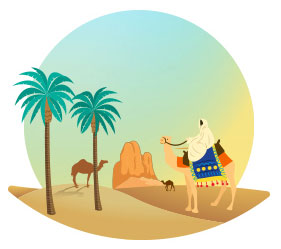Shahab Al-Din Abu Hafs Al-Suhrawardi
Shahab Al-Din Abu Hafs Al-Suhrawardi (1): The Sufi Sheikh and Shafi’i jurist and preacher, Al-Imam Al-Aarif “Sheikh Al-Islam” Abu Hafs (also known as Abu Nasr, Abu Abdullah, and Abu Al-Qasim), Shahab Al-Din Umar Bin Muhammad Bin Abdullah Bin Muhammad Bin Abdullah, also known as Amuwiah Bin Sa’d Bin Al-Hasan Bin Al-Qasim Bin Al-Nadhr Bin Al-Qasim Bin Muhammad Bin Abdullah Bin Abdel-Rahman Bin Al-Qasim Bin Muhammad Bin Abi Bakr Al-Siddiq, was a descendant of Abu Bakr Al-Siddiq who was born in Sohrevard and lived in Baghdad. He was the Grand Sheikh ul-Arifeen in Iraq at his time as well as the Grand Sufi Sheikh of Baghdad. He was also the author of Awarif ul-Maarif. He should not be confused with Shahab Al-Din Al-Suhrawardi Al-Maqtul, whose name was Abu Al-Futouh Yahya Bin Habash Bin Amirak (d. 587 AH).
Shahab Al-Din Abu Hafs Al-Suhrawardi Al-Bakri was born in either Sohrevard or Shahrizor, Zanjan at the end of the month of Rajab (or the beginning of Sha’ban) in 539 AH (1145 AD). His father was killed when he was six months old, so he grew up under the care of his paternal uncle, Abu Al-Najib, gaining knowledge from him about Tasawwuf, preaching, the science of hadith, and fiqh (jurisprudence).
Shahab Al-Din was known as a righteous man of prominence and was an important Muslim figure. He was a pious sheikh, jurist, scholar, preacher, and author who put great effort into his worship. He studied jurisprudence and literature and became the Grand Sheikh of Baghdad. He was also in charge of several Sufi ribats, and numerous Sufis received knowledge from him regarding the principles of worship and seclusion. He was sent by the royal court as a messenger to the kings of different countries and to many different places.
As a young man, Shahab Al-Din accompanied his uncle, Abu Al-Najib Abdul-Qahir Al-Suhrawardi, to Baghdad, learning from him as well as from Sheikh Muhi Al-Din Abdul-Qadir Bin Abi Salah Al-Jili. He received hadiths from Abi Zaraa Al-Maqdisi and others. He also received knowledge from Sheikh Aba Muhammad Bin Abdoun in Basra and came into contact with other sheikhs as well. He performed the Hajj pilgrimage several times and sometimes stayed in Makkah. Al-Dhiaa Al-Maqdisi, Ibn Naqta, Al-Zaki Al-Barzali, Al-Ezz Al-Farouqi, Al-Shahab Al-Abraqouhi, Al-Thahir Al-Rihani, Al-Sharaf Ibn Al-Nabilsi, and others all narrated on his authority.
Shahab Al-Din died in Baghdad on a Wednesday at the start of the month of Muharram in either 632 AH (1234 AD) or 630 AH, although 632 is more correct and widely documented. He was then laid to rest the next day in Wardiya. He was 93 years old when he died and had become blind before his death. He spent all of his wealth for sadaqah (charity) and did not leave enough for a burial shroud when he died. His funeral was attended by numerous people.
It was reported that when Shahab Al-Din Al-Suhrawardi performed the Hajj pilgrimage in 628 AH, many people from Iraq were performing Hajj along with him. When he saw crowds of people approaching him during his tawaf (circumambulations) around the Ka’bah and as he stood on Mount Arafat, imitating what he said and did, he asked himself: Am I to Allah what these people think of me? I also wonder… Have I been mentioned in the hadra of the Beloved today?
Sheikh Sharaf Al-Din Ibn Al-Faradh then appeared before him and said: “O Suhrawardi: The good tidings have been delivered to you, so unburden yourself – because you have been mentioned despite your faults.”
Upon hearing this, Sheikh Suhrawardi let out a scream and searched for Ibn Al-Faradh but did not find him. Sheikh Suhrawardi then said: “These are good tidings from he who is in the hadra.” They then met after that in the Holy Sanctuary, where they hugged one another and spoke privately for a long time.
Some people who attended Suhrawardi’s lessons said that he once recited the following words while sitting in his chair:
“Do not offer a drink to me alone, because you did not train me to deprive my companions of it. You are the generous one—and it is not from the etiquette of generosity to pass over one’s drinking companions without offering them a glass.”
He authored several other works of poetry as well.
Source: Kitab Al-Sulala Al-Bakria As-Siddiqia – Part II, by Ahmed Farghal Al-De’abassi Al-Bakri
Date of Publication
1 Ramadan 1438 AH / May 26, 2017 AD
(1) Al-Muqaffa Al-Kabir 8/ 711-714, Al-Bidaya Wal Nihaya, Ihiaa Al-Turath Ed. 13/ 162, Tarikh Ibn Al-Wardi 2/ 158, Tarikh Al-Islam, Bashar Ed. 14/ 78, Tarikh Irbil 2/ 150, Tarikh Baghdad wa Dhaylahu 15/ 287, Wafayat Al-Ayan 3/ 446, Tabaqat Al-Hufath, by Al-Dhahabi 4/ 166, Al-Nujum Al-Zahira fi Muluk Misr wa Al-Qahira 6/ 283-285, Nuzhat Al-Anam fi Tarikh Al-Islam pp. (60-62, 66-67), Sullam Al-Wusul ila Tabaqat Al-Fuhul 2/ 422, Al-Ansab, by Al-Sam’ani 7/ 307, Al-Takmila li Wafayat Al-Naqala 3/ 380-381, Masalik Al-Absar fi Mamalik Al-Amsar 8/ 224, Al-Asjad Al-Masbuk wa Al-Jawhar Al-Mahkuk fi Tabaqat Al-Khulafa wa Al-Muluk 1/ 467-468, Tabaqat Al-Shafi’ieen 1/ 835-836, Durar Al-‘Uqud Al-Farida fi Tarajim al-A’yan Al-Mufida 2/ 306-311, Al-A’lam, by Al-Zarkali 5/ 62, Al-Mausu’ah Al-Sufia pp. 213-215
